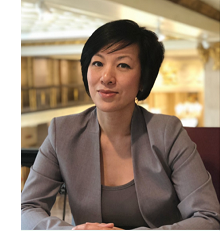

 Although more and more Asian Americans are running
for elected office, politics isn't considered a top career choice by
many. Part of this can be attributed to how daunting our political
system can be to the uninitiated. This is where Madalene Xuan-Trang
Mielke, President and CEO of the Asian
Pacific American Institute for Congressional Studies (APAICS),
comes in.
Although more and more Asian Americans are running
for elected office, politics isn't considered a top career choice by
many. Part of this can be attributed to how daunting our political
system can be to the uninitiated. This is where Madalene Xuan-Trang
Mielke, President and CEO of the Asian
Pacific American Institute for Congressional Studies (APAICS),
comes in.
With almost 25 years of experience as a political consultant,
Madalene is helping train the next generation of Asian American
governmental leaders by providing them with the knowledge and tools
to enter and succeed in politics. From the Virtual Youth Leadership Academy for high
school students to congressional fellowships for young AAPI
professionals, any AAPI who has an interest will have a chance to
explore their political possibilities.
While the political power of AAPIs
continues to grow, it still isn’t a recognized force just yet.
What can we do to get our voices heard?
 Being engaged citizens at every
level of government is a key factor. AAPIs can provide input about
policy decisions by learning which advocacy organizations align with
your values and volunteering your time and expertise. Getting to
know your local elected leaders is important in understanding how
they work with the AAPI community or in the areas of interest to
you. Sharing your perspective on how policies affect your life
educates people about the real-life consequences of legislation.
Identifying the influencers and stakeholders who may not know about
the issues that the AAPI community is facing can also bring more
AAPI perspectives into policy and political discussions. The Asian
Pacific American Institute for Congressional Studies (APAICS)
conducts leadership training if you’re interested in learning more
about running for office.
Being engaged citizens at every
level of government is a key factor. AAPIs can provide input about
policy decisions by learning which advocacy organizations align with
your values and volunteering your time and expertise. Getting to
know your local elected leaders is important in understanding how
they work with the AAPI community or in the areas of interest to
you. Sharing your perspective on how policies affect your life
educates people about the real-life consequences of legislation.
Identifying the influencers and stakeholders who may not know about
the issues that the AAPI community is facing can also bring more
AAPI perspectives into policy and political discussions. The Asian
Pacific American Institute for Congressional Studies (APAICS)
conducts leadership training if you’re interested in learning more
about running for office.
What misconceptions are there about a life in politics?
That it’s glamorous. Public servants usually put their constituents
first. People who work on campaigns work long hours because they
believe in the cause or the candidate who wants to bring forth good
public policy. It’s hard work and it’s so fulfilling to know that
you’re helping people.
Do you think the barriers that exist for AAPIs in politics today
are more internal or external? What do you think can be done to
change this?
It’s a combination of external and internal factors. We’re working
in a system that was built for white men (the Founding Fathers) and
with that in mind, there are so many external factors that are out
of our control that affect elections. Whether it’s voter
registration laws or language access, these external factors play a
role in how active the AAPI community can be in the electoral
process. At the same time, we can’t let any internal dialogue that
creates self-doubt add onto these external factors. AAPIs are an
integral thread of the fabric that is the United States of America.
That’s why this country is so incredible. It’s all of our individual
identities and heritages that weave the story that is America.
What is an easy first step to get politically/civically involved
for someone who has never done anything before?
Register to vote and exercise your right to vote in every election.
Learn more about the elected officials who represent your locality
and see if they regularly meet with their constituents. Talk with
them!
How have you seen the political landscape change for AAPIs since
you started your career?
Yes and for the positive! More AAPIs are running for office than
ever before and when AAPIs are on the ballot, more AAPIs come out to
vote. This is a wonderful result of having more AAPIs engaged in the
electoral process. APAICS is here to demystify the process and make
public service more accessible. We would like to see more AAPI women
entering public service. As a result, APAICS created The Women’s
Collective to help build a network and offer workshops to create
opportunities to learn how to build your leadership skills and
coalitions.
What is the best piece of advice you have received?
Don’t be afraid to bring your authentic self to wherever you take up
space.
_______________________
Images by the Asian Pacific American
Institute for Congressional Studies (APAICS).